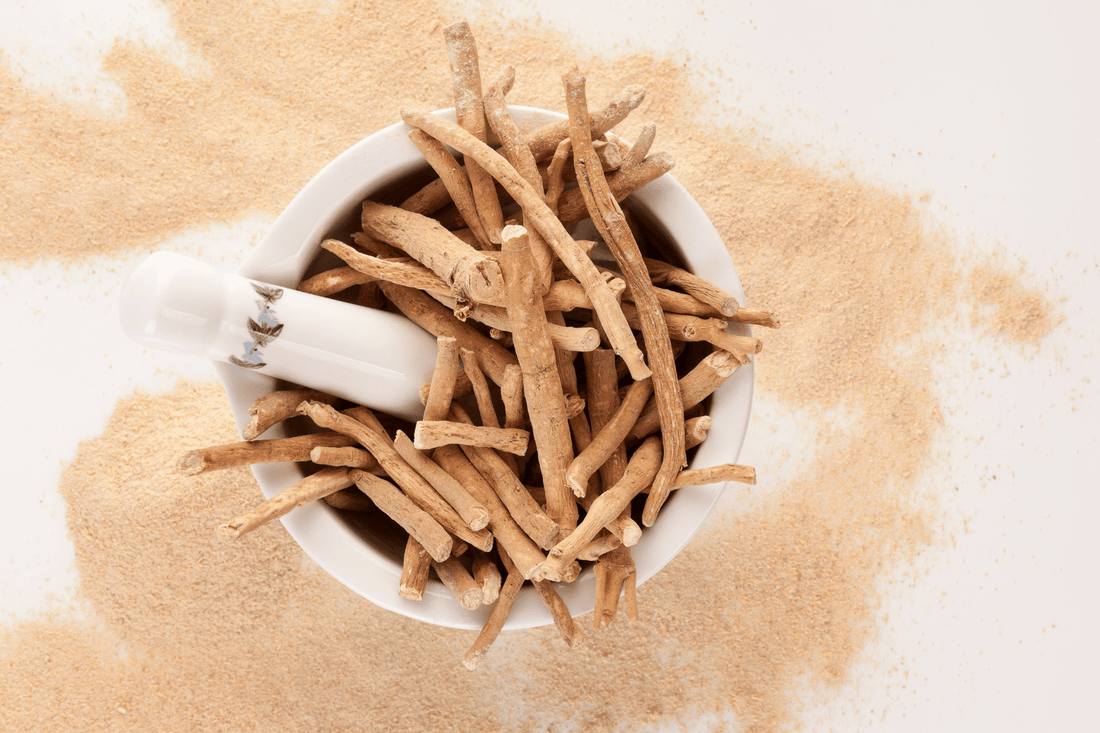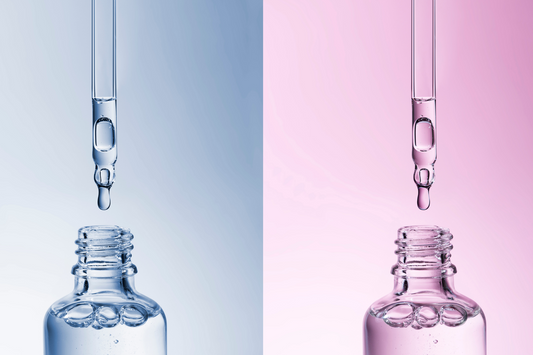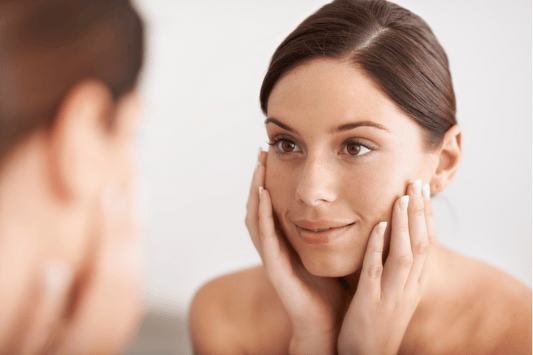Ashwagandha (Withania somnifera) is an ancient herb used for centuries due to its natural healing properties for various ailments. Today, ashwagandha has seen a resurgence in popularity in the health, wellness, and alternative medicine spaces.
More recently, ashwagandha has gotten attention as a potential supplement for hair health. But is this ingredient actually effective?
When it comes down to it, there currently isn’t any concrete evidence to show that ashwagandha promotes healthy hair growth. That said, let’s discuss ashwagandha, whether or not it can help your hair, and what you can turn to instead.
What Is Ashwagandha?
Ashwagandha—also known as Indian ginseng or winter cherry—has been used as a healing agent for over 3,000 years in Ayurveda, a form of alternative medicine traditionally practiced in India.
Ashwagandha is native to the Mediterranean, South Asia, Central Asia, and Africa. Ashwagandha is an herbal adaptogen that may help your body control hormonal imbalances and adapt to internal and external stressors.
Various components of the ashwagandha plant may support overall health by easing the body’s stress response, and consumption is thought to support fertility, energy, immunity, and an improved quality of sleep. However, ashwagandha’s so-called benefits for hair remain largely unsupported.
The roots and leaves of the ashwagandha plant contain bioactive steroids called withanolides and withaferins, which may have stress-reducing properties and nutrients.
While the ingredients found in ashwagandha may not directly impact hair growth or hair health, let’s take a look at how those ingredients may indirectly provide support for your locks.
Can Ashwagandha Help My Hair?
Components in ashwagandha serve as powerful antioxidants, which are known to provide anti-aging benefits for the body. However, it’s important to note that ashwagandha and its bioactive compounds may not directly affect your hair or other parts of your body in a focused, targeted manner. What’s more, each person is different, and ashwagandha’s benefits can vary largely from person to person depending upon a variety of factors.
As an oral supplement, ashwagandha may benefit overall health and wellness, but any direct benefits for hair are largely unproven. Even with the general health benefits below, further research is needed to determine how concrete and measurable these effects are.
Let’s look at some of the most widely discussed potential benefits of ashwagandha and whether or not you can rely on them.
Ashwagandha for Stress Relief
According to studies, ashwagandha might help you manage stress and anxiety levels.
However, researchers used a wide range of study methods to come to this conclusion, so the results may not be reliable.
Does Ashwagandha Balance Your Hormones?
It’s important to note that there currently is insufficient research to prove hormonal benefits, and it’s best to wait on using ashwagandha for achieving hormonal balance until additional studies come out. Crucially, taking any drug or supplement to impact your hormones and endocrine system should only be done under the supervision of your doctor. To be clear: Whether or not the effects are genuine, if you believe that ashwagandha is impacting your hormones and this is a key reason for why you’re taking it as a supplement, you ought to keep your doctor informed and in the loop.
As herbal supplements can impact each person differently, there is no reliable evidence to suggest that every individual will benefit from ashwagandha for hormonal balance. Regardless of whether you choose to take ashwagandha or not, if you fear you’re dealing with a hormonal imbalance, you should consult your doctor to get to the bottom of it. Your doctor will be able to work with you to identify the cause and craft a treatment plan accordingly.
Can Ashwagandha Help an Irritated Scalp?
Scalp irritation can damage your hair follicles, which in turn can prohibit hair growth. In some cases, scalp irritation is one of the primary causes of persistent hair loss.
However, there is no evidence that ashwagandha can help ease scalp issues like flaking, itchiness, or irritation when taken orally.
Finding the root cause of your scalp irritation may be a better means of finding the relief you’re seeking. Scalp irritation can arise due to a variety of factors, like allergies, infections, or dandruff, each of which calls for a different treatment method.
Ashwagandha and Antioxidants
Ashwagandha is full of antioxidants, but oral supplementation of ashwagandha likely won’t be able to support your hair health or hair follicles directly.
Antioxidants themselves can largely support your overall health and wellbeing, but they are not a direct solution or treatment for hair loss or hair health. There are also better dietary sources of antioxidants like fresh fruits and vegetables which can better integrate into your dietary regimen.
Does Ashwagandha Make Your Hair Stronger?
Certain vitamins, like a vitamin B complex, can support healthy hair growth, so they’re certainly worth adding to your daily care routine.
Ashwagandha is particularly rich in flavonoids, high in vitamin C, and packed with protein, iron, glucose, nitrate, and potassium, which can all support your overall health, but likely won’t target your hair health directly when taken orally. When taken as a supplement or a tea, however, many of those common dietary nutrients will not be present in appreciable amounts.
In addition, the nutrients that are abundant in ashwagandha can also be found in a variety of other food sources. This means you may be able to get the same support for your health just by maintaining a balanced diet full of a wide range of foods.
Can Ashwagandha Moisturize Hair?
Ashwagandha may boost dehydroepiandrosterone (DHEA) levels, which in turn may increase collagen production and sebum from your scalp’s sebaceous glands. However, DHEA is more directly connected to energy levels and overall wellbeing, not to any targeted effects on the scalp. Thus, oral supplementation of ashwagandha likely won’t help moisturize your hair or scalp.
Staying hydrated, avoiding overwashing your hair, and limiting how often you use heat styling tools can help you maintain moisturized hair without needing an additional supplement.
Topical formulas also offer an even more direct way to support your hair and scalp health. Conditioning products, hair masks, hair serums, and hair oils are just a few options that may help you achieve better hair hydration.
Can Ashwagandha Combat Hair Loss?
Ashwagandha may support overall health and combat stress, but there is no reliable evidence to back the idea that ashwagandha can either prevent or treat hair loss.
It may be best to opt for clinically tested, targeted products to stave off hair loss troubles stemming from stress, genetics, alopecia, or hormone imbalances.
What Can I Use Instead of Ashwagandha?
Because ashwagandha’s benefits for hair remain largely unproven, you may want to rely on more targeted products to support your hair health.
Hair Revival Serum
Here at Revela, we strive for visible results and scientifically backed solutions. As scientists ourselves, we value skepticism and thinking outside the box, but we’re interested in proven options to get your hair growing without wasting your time or money.
Our Hair Revival Serum is one of those clinically proven options, and you can’t get the active ingredient, ProCelinyl™, anywhere else. Our serum contains a concentrated formula that works to rejuvenate dormant hair follicles, helping to address hair troubles that could be caused by hormones, stress, genetics, alopecia, or vitamin deficiencies.
Alongside ProCelinyl, our serum contains aloe vera, saw palmetto, B vitamins, and caffeine to support thicker, fuller-looking hair with visible results in six to eight weeks. Our formula offers optimized scalp and follicle penetration for fast results and is suitable for all hair—regardless of gender, age, hair type, or ethnicity.
Ready to nix your hair troubles? So are we. With Revela, your results are guaranteed in 60 days or your money back.
Hair Masks
Home remedies are an efficient and affordable way to support your hair and scalp, but they may not offer the immediate impact you’re looking for. To soften and moisturize your hair as part of DIY spa-like experience, you can try making your own at-home hair mask using common ingredients like banana, oats, avocado, or egg.
Revamp Your Diet
Vitamin deficiencies are a primary cause of hair troubles, and revamping your diet may help your hair and your health.
Aim to incorporate a wide variety of foods, like whole grains, fruits, vegetables, and lean protein, and consider visiting your doctor for testing if you suspect you may have a vitamin deficiency. In some cases, supplements of certain vitamins or minerals may be necessary to help restore your levels.
Address Underlying Health Concerns
If you suspect your hair troubles may be the result of underlying health conditions or issues, consult your healthcare provider for further guidance. Your provider can work with you to identify the root cause of your concerns and address them. For example, if you are experiencing hair loss due to gaps in your diet, your doctor may suggest you eat more of certain foods or begin taking supplements.
Hormone imbalances, pregnancy, stress, and certain health conditions can all contribute to hair troubles, and a doctor can help you determine what the cause is.
How Long Does It Take for Ashwagandha To Work?
There are no concrete timelines regarding how long it will take for ashwagandha to work, if at all. General findings suggest that it can take 8-12 weeks for the bioactive ingredients found in ashwagandha to begin to take effect.
This protracted, indefinite length of time means that there isn’t a concrete answer for how long it might take for you to see results. Ashwagandha can work differently for each individual, and you need to be open to the possibility that you may not see your desired results at all—even after those 12 weeks pass.
If you want fast, reliable, and visible results, you’re better off seeking out a different solution that’s passed scientific scrutiny.
Is Ashwagandha Safe for Everyone?
Ashwagandha may interfere with some medications and health conditions, so you should consult with a healthcare professional before supplementing with ashwagandha.
If we’re being honest, though? You shouldn’t have to worry about whether your hair health treatment is interfering with your medication! There are plenty of simpler ways to achieve healthier, fuller-looking hair without switching up your prescriptions, significantly altering your lifestyle, or worrying that your health is at stake.
What Are the Side Effects of Ashwagandha Supplementation?
Not only do we need more research regarding ashwagandha’s benefits, but oral supplementation of ashwagandha may not be entirely safe.
Ashwagandha can have a wide variety of side effects, so it’s essential to consult with your doctor before taking ashwagandha orally. Ashwagandha may interfere with medications and some health conditions, such as diabetes, high blood pressure, and thyroid conditions, to name a few.
Side effects may include:
- Drops in blood pressure.
- Sleepiness, headaches, stomach discomfort.
- Rapid heartbeat, also known as tachycardia.
- Allergic reactions can occur when taken in high doses. People with allergies to plants in the nightshade family (Solanaceae) may be intolerant to ashwagandha at any dose.
- May promote hyperthyroidism.
- Risks exist for those who are pregnant or breastfeeding, meaning these groups should avoid taking ashwagandha.
- When taking ashwagandha, you must avoid sedatives such as barbiturates, alcohol, and benzodiazepines.
Before adding any new supplement to your regimen, always talk to your doctor or another medical provider to determine whether the supplement will be safe for you to use.
A Summary on Ashwagandha Benefits for Hair
Ashwagandha remains largely unproven when it comes to providing any benefits for hair health. This adaptogenic herb may support the body’s stress response and overall health, but there is no evidence suggesting that oral supplementation of ashwagandha will directly improve, prevent, or address hair troubles like hair loss or hair health.
Instead, it may be best to try out a more targeted solution for hair troubles, and at Revela, we’ve got you covered.
Our Hair Revival Serum works to specifically target and rejuvenate your dormant hair follicles with a plethora of natural ingredients—all without toxins, hormones, parabens, or phthalates. Our formulated serum is designed for all hair regardless of age, gender, ethnicity, or hair type, and it can help form part of a regimen to address hair troubles resulting from genetics, vitamin deficiencies, alopecia, hormonal imbalances, and stress.
Give your roots the fresh start they deserve by nurturing them and restoring your hair to its younger self. Clinical tests show results in as little as 6-8 weeks, so say goodbye to hair troubles and say hello to thicker, fuller-looking hair!





